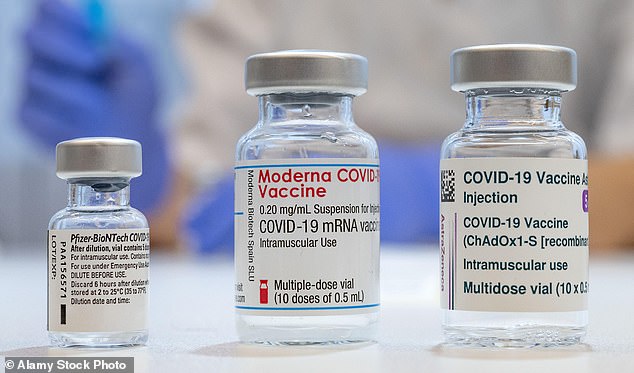[ad_1]
Covid vaccines may have been less effective than first thought, a major new analysis suggests.
The World Health Organisation (WHO) claims their roll–out prevented 14.4 million deaths worldwide in their first year, with some estimates closer to 20 million.
But new research by Japanese scientists indicates that, while the mRNA jabs made by Pfizer and Moderna undoubtedly prevented severe illness, immune protection dipped much faster than expected.
Analysing antibody data from more than 2,500 adults, the team found almost half experienced a ‘rapid’ decline in immunity within nine months of a booster.
Covid infection rates were also around 15 per cent higher in this group compared with those whose antibody levels stayed high.
Experts called the findings ‘important’ and said they pointed to a need for more ‘individualised vaccination strategies’ to keep people protected for longer.
However, they cautioned more research is needed to explain why the vaccines, injected into muscle, seem to trigger weaker responses in some people.
The technology behind the shots was first pioneered in 2005, with the Pfizer–BioNTech and Moderna Covid vaccines the first to be widely deployed.

Last year, the World Health Organisation (WHO) claimed jabs had prevented the deaths of 14.4 million people globally in their first year alone, with some estimates putting the figure closer to 20 million
Messenger RNA, or mRNA, is a genetic blueprint that instructs cells to manufacture proteins in the body.
Unlike traditional vaccines, which use a live or weakened virus, mRNA shots give cells the code to produce a harmless version of the Covid spike protein.
This ‘trains’ the immune system to recognise the virus and mount a defence if the real thing is encountered.
In the new study, researchers analysed antibody data from 2,526 people in Fukushima, collected between April 2021 and November 2022.
All had received two doses and a booster of either the Pfizer (BNT162b2) or Moderna (mRNA–1273) vaccine.
Over an 18–month follow-up, the team identified four distinct patterns of immune response after the booster.
Some maintained high antibody levels over time, classed as ‘durable responders’. About 19 per cent started strong but dropped quickly—the ‘rapid decliners’.
A further 28 per cent produced few antibodies that also fell away rapidly, dubbed ‘vulnerable responders’. The rest were ‘intermediate responders’.

A 2022 study led by academics at Imperial College London suggests almost 20million lives were saved by Covid vaccines in the first year since countries began rolling out the jabs, the majority in wealthy nations
Taken together, nearly half of participants—the ‘rapid decliners’ and ‘vulnerable responders’—lost substantial antibodies within just nine months of a booster.
The researchers described the difference in Covid infection rates as ‘modest’.
But while 5.2 per cent of ‘durable responders’ were infected, the rate rose to six per cent among the rapid and vulnerable groups—a relative increase of about 14 per cent.
Within three months of a booster, one in five in these categories had caught Covid, rising to half by six months, compared with only around one in five of the durable group.
Writing in Science Translational Medicine, the team from Nagoya University said the two groups did not ‘maintain their antibody levels at high enough concentrations for an extended period after booster vaccination’.
They added: ‘We found that these two groups were at high risk for infection following booster vaccination.’
Administering ‘additional booster doses’ or even separate ‘antibody therapy’ may be warranted, they suggested.
However, the researchers said it remains unclear why some people are more vulnerable to a weaker antibody response.

People with PVS also had elevated levels of Covid spike proteins. The levels in PVS patients were even greater than those found in patients with long Covid , a condition with similar symptoms linked to the virus itself
‘Therefore, it will be important in the post-Covid pandemic era, as well as during future pandemics, to evaluate the impact of additional booster doses on individuals predicted to be part of vulnerable or rapid decliner populations,’ they wrote.
‘These findings highlight the need for further investigation to support the development of fully individualised vaccination strategies.’
To date, more than 13.6 billion doses of Covid vaccines have been administered worldwide, with around 70 per cent of people receiving at least one dose.
The mRNA vaccines are widely credited with helping bring an end to the series of paralysing lockdowns during the pandemic.
The new study, however, comes amid growing discussion of what some researchers have dubbed ‘post-vaccination syndrome’.
Reported only in connection with mRNA jabs such as Pfizer and Moderna—not AstraZeneca, which used a different type of technology—the condition has been linked to symptoms including brain fog, dizziness, tinnitus and exercise intolerance.
Some patients have also shown distinct biological changes, such as altered immune cells and traces of coronavirus proteins in their blood years after vaccination.
The syndrome is also said to raise the risk of reactivating the dormant Epstein–Barr virus, which can cause flu–like illness, swollen lymph nodes and nerve problems.
But researchers stress these findings remain preliminary. Studies have not yet been peer reviewed or formally published, and the authors emphasise the results are ‘still a work in progress’.
[ad_2]
This article was originally published by a www.dailymail.co.uk . Read the Original article here. .

